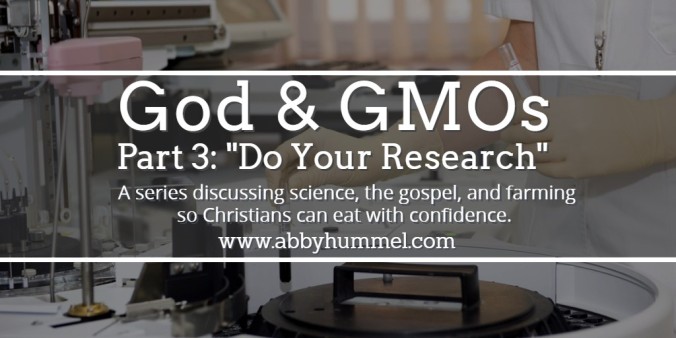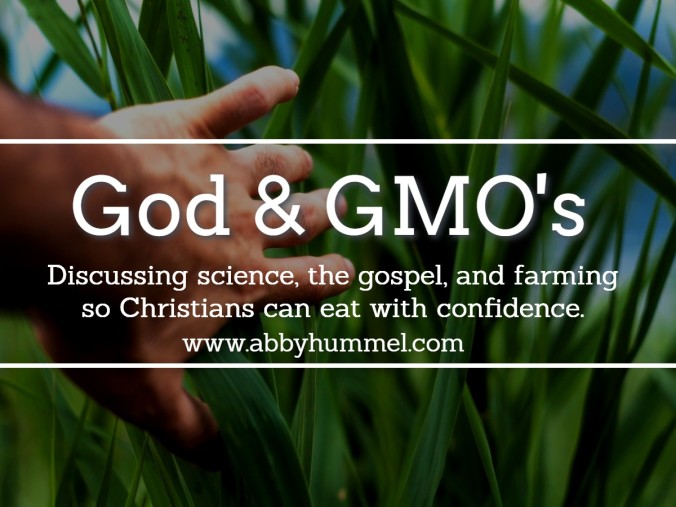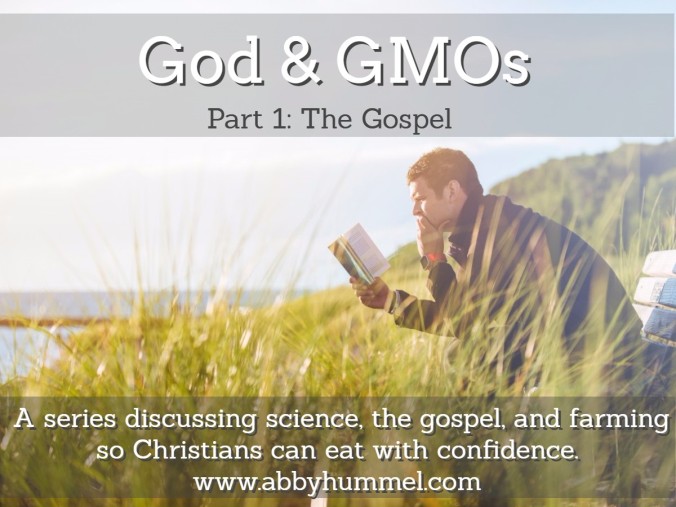Welcome to Part 3 of God & GMOs, a series I’m writing in consultation with my molecular biologist husband, Aaron. If you’re new around here, you might want to check out the Introduction, Part 1: The Gospel, or Part 2: What is a GMO? and say “hi” in the comments. I know most readers probably haven’t heard much in favor of GMO crops online or in your church, so let me know if you have any questions or need clarification as we go!
Be sure to subscribe by email (on the right hand side of the screen —-> over there) so you don’t miss an entry!

When you start asking questions about something like GMOs, the most common refrain you’ll hear is “Do your research.” The availability of information today is astounding. The collective wisdom of the known world is available in the palm of our hand.
But the collective foolishness of the world is there, too. Anyone can write anything on the internet, and scientists (in academia and in the bigger industrial corporations) drastically underestimated the power of social media for steering the conversation about GMO crops. It’s frustrating to know how much information is swirling through the internet, especially in blogs, podcasts, and documentaries. If you’re browsing Netflix documentaries or typing your questions about GMOs into a search bar you’ll find lots of information that could very well be wrong. This freedom and availability of information is wonderful, but it comes with serious responsibilities. Fair or not, another equally important question that absolutely must accompany our previous concerns is: How can I find reliable explanations about GMOs? What’s a good source for my information?
My biggest problem with “do your research” cultural pressure is that there’s a specific end in mind, always opposed to scientific consensus: Do your research, and you’ll see that Big Ag/Pharma/Medicine is corrupt and I have found the superior way. It carries the implication that anyone who follows the conventional path is “uninformed.” In reality, anyone can write a blog, even about topics they don’t know much about. (I hesitated to write this series for years because I’m describing myself there, too.) Anyone can make a documentary. Anyone can craft a clever meme or infographic. Many of these “alternative sources” about science are just as biased and arrogant as they accuse professional scientists of being.
Aaron’s biggest problem with that phrase is that it’s a misuse of the word “research.” As someone whose life work is in scientific research and development, he’ll tell you that reading things on the internet is not scientific research. A frantic Google search is not equivalent to a series of laboratory tests or the body of work necessary to earn an advanced degree. This is an important distinction.
The Scientific Method & Scientific Research Today.
Do you remember science fairs from school? I do, because (believe it or not!) I actually won a competition during my junior year of high school. I did a lame project that took me an hour and I tell you the truth, I just copied-and-pasted the report requirements from an email into a Word Document to fill in my results. Many of the other entries came as the result of an entire semester’s worth of hard work, in some cases from students who have since become medical doctors. My project was not “high school science fair winning” caliber, but I won because I followed the scientific method. I scrupulously documented my observations, hypothesis, experiment, and results so the judges could figure out what was happening and could replicate the experiment to see if my findings were consistent. My classmates worked harder than me, but they were sloppy with their research and couldn’t answer some of the judges’ questions. I’ll confess that winning didn’t feel great. My physics teacher and another judge chided us all: me, for not coming up with a harder project, and everyone else for not documenting their research appropriately.
This gives us a helpful way to work through “anti-GMO studies” and “pro-GMO studies.” When Aaron publishes research, which is the professional grown-up version of a science fair project, he spends years working 60+ hours a week of compiling data, organizing it, and collaborating with his partners before sending the report to a “journal,” or an academic publishing team. A while later, he’ll receive a bunch of comments from a team of editors and blind reviewers acting as “science fair judges” with questions, criticisms, or recommendations to tackle before the research can make it to publication. (EDIT: Michelle, a professional scientist, explains further in the comments “My clarification would be this: those “editors and blind reviewers” are other scientists in the field, meaning colleagues and competitors. The reviewers are especially knowledgeable and invested in the quality of work being performed and published, because this work shapes the body of knowledge in their field. The very currency of their profession is critical thinking and their mantra is “show me the data.” In short, these are not a group of easily convinced or impressed peers. One’s research must be well supported by evidence in order to earn publication.”) The group seeking publication must meticulously record their methods, materials, and procedures. If another group repeats their project and gets different results it could have disastrous consequences for their academic and professional credibility.
When I look at anti-GMO sources, they usually paint the scientific community as a bully clique group trying to keep the truth hidden for their own profit, and say that the “powerful” scientists are suppressing studies showing GMOs to be harmful (or something like that). In reality scientists are only as prone to corruption and greed as any of us, and the community polices itself using a firm commitment to the scientific method, and the necessity of collaboration and peer review. So far the anti-GMO studies have not demonstrated anything that passes the muster of other scientists.
A good example of this is work from Gilles-Eric Seralini, a scientist from France who published a paper claiming GMO corn and the popular herbicide glyphosate (brand name “Round Up”) were associated with terrible tumors in his laboratory rats. This study was later retracted after criticism from the scientific community as a whole concerning poor methods (he used a breed of rats that were inappropriate for this study because of their natural propensity to develop huge tumors), his changing hypothesis, and his obscure control groups (there were not enough rats in the control group and their feeding plan was not sufficient to compare them to rats eating GMO corn). As the spouse of a scientist, I’ll tell it to you straight: these folks don’t mess around. If they can poke a hole in an argument or find something wrong with a method or conclusion, they will, and they aren’t really worried about hurting anyone’s feelings in the process. The ways the scientific community responded to Seralini’s poor research with legitimate, reasonable criticisms gives me quite a bit of confidence in the process of scientific publication and peer review. Still, I see this guy’s work touted on social media and in “natural living” blogs as evidence against GMO crops on a regular basis.
Reading “Real” Science Research.
The catch for most people here is that you have to pay to look at most of the studies published in reputable journals. If you want to look at the research scientists are doing in this field, you can search online but the reliability of free (or “open access”) studies varies widely. They aren’t all bad, but the limitations can be different. (Don’t hate too hard on scientists for this, though, because it is standard across all disciplines. My friend who is an English professor was just lamenting about paid access to research published in her field, too.) If you don’t want to shell out money to read technical scientific publications, you would be wise to check out some science journalists and other groups who are reading these studies and talking about them.
Some excellent sources would be The Genetic Literacy Project and the Talking Biotech Podcast. We’re ecstatic about the upcoming documentary called Food Evolution. The Skeptical Raptor blog also has a wealth of DOCUMENTED information about discerning scientific sources, and is worth clicking around in as well.

Thanks for reading! If you want to chat, I’d love to know how YOU evaluate sources for your information. Do you read blogs? Watch documentaries? Do you fact check much? Is that important to you?
If you missed anything, check out the Introduction, Part 1: The Gospel, and Part 2: What is a GMO? to get up to speed. I’ll be back soon with some practical application of scripture and the Christian community’s responsibility to practice discernment and uphold truth in all aspects of life!





